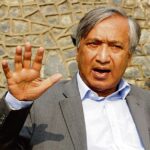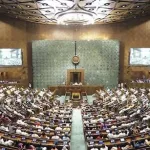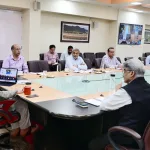Srinagar, Apr 07: Jammu and Kashmir Apni Party (JKAP) President Syed Mohammad Altaf Bukhari on Monday announced his party’s decision to move the Supreme Court against the recently passed Waqf Amendment Bill.
Expressing concerns over the bill’s impact on religious freedom, Bukhari said the issue transcends community lines, asserting that it is a matter of democracy and secularism in India. The JKAP has called for peaceful resistance and urged the Government of India to reconsider the law, which it argued undermines the sanctity of religious trusts.
Addressing the reporters here, Bukhari voiced strong opposition to the Waqf Amendment Bill, which he believes infringes upon the rights of religious communities to manage their own institutions.
The bill, passed by the Indian Parliament, has sparked widespread concerns, especially among the Muslim community, which views Waqf properties not as mere assets but as sacred trusts between the community and Allah.
“The Waqf institutions are not physical assets but trusts, and when the government intervenes in this sacred relationship, it jeopardises the religious freedom guaranteed by India’s democracy,” Bukhari said. He added that while there may have been instances of mismanagement in the past, it does not justify the government’s intervention.
At a meeting attended by 24 committee members of the JKAP, a unanimous resolution was passed condemning the bill. The resolution urges the government to engage in meaningful consultations with community leaders, scholars, and legal experts before implementing any reforms related to Waqf institutions.
The party also called for peaceful and lawful resistance against the bill, highlighting the importance of protecting the secular fabric of India.
The Apni Party Chief stressed that the bill would disproportionately affect Muslims, especially in Jammu and Kashmir, where the community is in the majority. However, he also argued that this issue concerns all citizens, as it threatens the fundamental principle of religious freedom that is essential for the country’s unity.
“This is not just about Muslims; it is about every citizen’s right to manage and govern their religious institutions,” Bukhari said.
The JKAP has decided to take the matter to the Supreme Court, with plans to file a petition challenging the bill. Advocate Gowhar, President of the District Bar Association, will represent the party in the legal battle.
Bukhari reaffirmed the party’s commitment to pursuing legal recourse and peaceful protest to protect the sanctity of religious institutions. He expressed hope that the Supreme Court, which has consistently upheld the secular fabric of the country, will act in the interest of justice.
The former minister also called on fellow citizens to support the cause, saying this is not just a political issue but one that affects the very principles of democracy and religious freedom in India.








